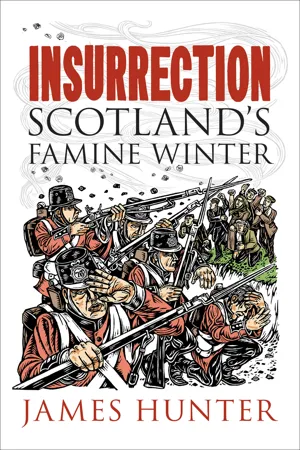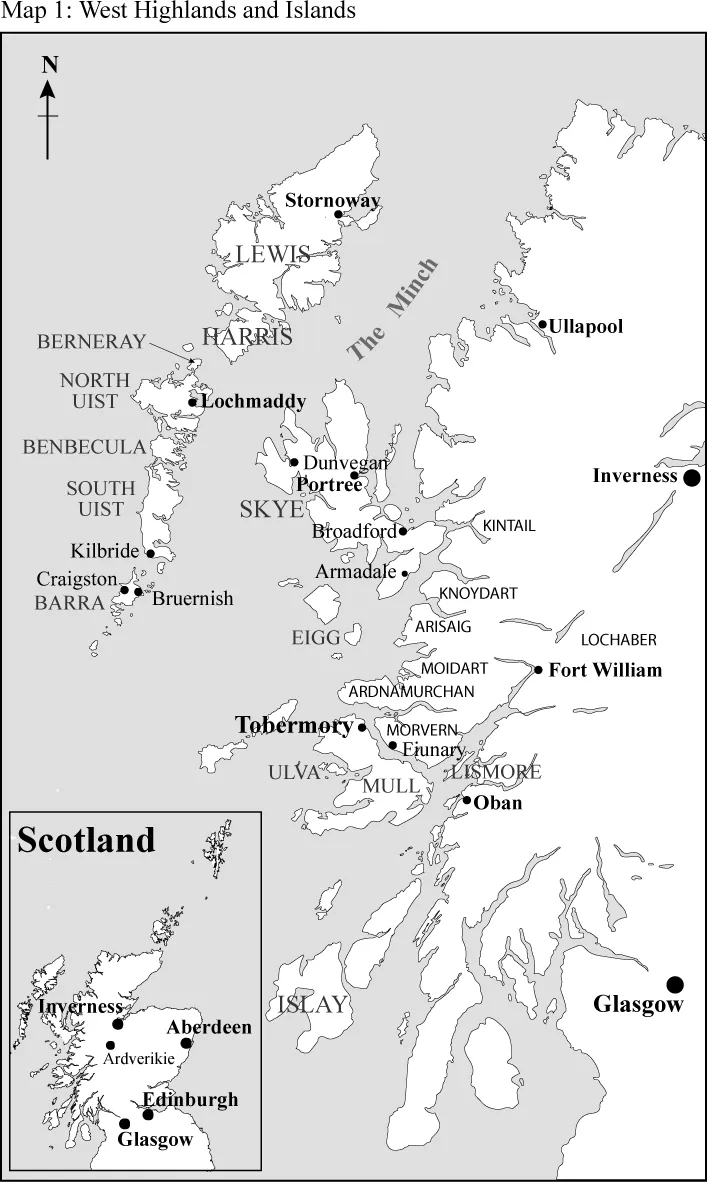
- 437 pages
- English
- ePUB (mobile friendly)
- Available on iOS & Android
eBook - ePub
About this book
The author of
On the Other Side of Sorrow gives a detailed account of the causes and effects of the Scottish potato famine that began in 1846.
When Scotland's 1846 potato crop was wiped out by blight, the country was plunged into crisis. In the Hebrides and the West Highlands, a huge relief effort came too late to prevent starvation and death. Farther east, meanwhile, towns and villages from Aberdeen to Wick and Thurso protested the cost of the oatmeal that replaced potatoes as the people's basic foodstuff.
Oatmeal's soaring price was blamed on the export of grain by farmers and landlords cashing in on even higher prices elsewhere. As a bitter winter gripped and families feared a repeat of the calamitous famine then ravaging Ireland, grain carts were seized, ships boarded, harbors blockaded, a jail forced open, and the military confronted. The army fired on one set of rioters. Savage sentences were imposed on others. But crowds of thousands also gained key concessions. Above all they won cheaper food.
Those dramatic events have long been ignored or forgotten. Now, in James Hunter, they have their historian. The story he tells is, by turns, moving, anger-making, and inspiring. In an era of food banks and growing poverty, it is also very timely.
Praise for Insurrection
"Hunter never forgets that history is first of all narrative—and this book is rich in stories—or that is subject is the experience of individual men and women, creatures of flesh and blood, not abstractions. Insurrection is fascinating reading, both painful and uplifting." —Allan Massie, the Scotsman (UK)
When Scotland's 1846 potato crop was wiped out by blight, the country was plunged into crisis. In the Hebrides and the West Highlands, a huge relief effort came too late to prevent starvation and death. Farther east, meanwhile, towns and villages from Aberdeen to Wick and Thurso protested the cost of the oatmeal that replaced potatoes as the people's basic foodstuff.
Oatmeal's soaring price was blamed on the export of grain by farmers and landlords cashing in on even higher prices elsewhere. As a bitter winter gripped and families feared a repeat of the calamitous famine then ravaging Ireland, grain carts were seized, ships boarded, harbors blockaded, a jail forced open, and the military confronted. The army fired on one set of rioters. Savage sentences were imposed on others. But crowds of thousands also gained key concessions. Above all they won cheaper food.
Those dramatic events have long been ignored or forgotten. Now, in James Hunter, they have their historian. The story he tells is, by turns, moving, anger-making, and inspiring. In an era of food banks and growing poverty, it is also very timely.
Praise for Insurrection
"Hunter never forgets that history is first of all narrative—and this book is rich in stories—or that is subject is the experience of individual men and women, creatures of flesh and blood, not abstractions. Insurrection is fascinating reading, both painful and uplifting." —Allan Massie, the Scotsman (UK)
Tools to learn more effectively

Saving Books

Keyword Search

Annotating Text

Listen to it instead
Information


Some key characters
Several hundred individuals are named in this book. Most feature in only one episode. A number, however, turn up more frequently. They are listed here.
Aldcorn, Andrew Medical doctor, Oban, active in Free Church famine relief efforts.
Allan, John Grain-dealer, Elgin.
Balmer, Thomas Richmond Estate commissioner, Fochabers.
Cameron, Patrick Elginshire (Moray) Sheriff-Substitute, based Elgin.
Coffin, Commissary-General Sir Edward Pine Senior officer, Commissariat.
Colquhoun, William Inverness-shire Sheriff-Substitute, based Inverness.
Currie, Alexander Sheriff of Banffshire.
Davidson, Angus Cooper, Burghead.
Evans-Gordon, Captain Charles Army officer, 76th Regiment.
Falconer, James Shoemaker, Burghead.
Fraser, Andrew Inverness-shire Sheriff-Substitute, based Fort William.
Fraser-Tytler, William Sheriff of Inverness-shire.
Gordon, Colonel John Owner of Barra, South Uist and Benbecula.
Gregg, James Caithness Sheriff-Substitute, based Wick.
Grey, Sir George Home Secretary.
Harney, Julian Chartist activist and editor.
Hope, Lord John High Court judge.
Innes, Cosmo Sheriff of Elginshire (Moray).
Jardine, John Sheriff of Ross-shire.
Lindsay, John Crown Agent, Edinburgh.
Loch, James Sutherland Estate commissioner and Wick MP.
MacDonald, Donald Parish priest, Barra.
MacKay, John Procurator Fiscal, Inverness.
MacLeod, Alexander Barra, South Uist and Benbecula factor.
MacLeod, John Church of Scotland minister, Morvern.
Main, John Fisherman, Hopeman.
Miller, Hugh Cromarty-born writer and newspaper editor.
Nicolson, Alexander Church of Scotland minister, Barra.
Nicolson, James Shoemaker, Pulteneytown.
Pole, George Investigating officer, Commissariat.
Pringle, John Banffshire Sheriff-Substitute, based Banff.
Rhind, Josiah Banker and provost, Wick.
Rutherfurd, Andrew Lord Advocate.
Shaw, Charles Inverness-shire Sheriff-Substitute, based Lochmaddy.
Simpson, William Provost of Inverness.
Sutherland, Daniel Fisherman, Hopeman.
Thomson, Robert Sheriff of Caithness.
Trevelyan, Charles Treasury civil servant.
Waters, David Free Church minister, Burghead.
Young, John Fisherman, Hopeman.
Young, William Principal proprietor, Burghead.
Introduction
Kinlochlaggan • Ardverikie • Hopeman
The three women walking down the road from Newtonmore to Kinlochlaggan on an August day in 1847 were strangers to this part of the Scottish Highlands. That might have been guessed from their clothes, which, though standard where they came from, are likely to have jarred a little with the more sober styles then favoured hereabouts. Still more suggestive of the three being far from home would have been the way they talked. The women’s conversation, and there must have been quite a bit of that as they neared their destination, was not in Gaelic, the everyday language of most of this inland area’s mid nineteenth-century residents. Instead, they spoke in the Scots dialect of a distant and coastal community.
At the close of a document compiled for them in the days following their long tramp to Kinlochlaggan, each of the three walkers, none of whom could write, put ‘her mark’, in the shape of a shakily inscribed X, beside her name. All were married. In the old Scots style, however, the surnames entered on this document, preserved today in Britain’s National Archives in Kew, were not the surnames of the women’s husbands. Mary Jack, Isabella Main and Margaret Main, when marrying, had seen no reason to give up names that had been theirs since childhood.1
In normal times, to be an outsider in Badenoch, the district Margaret, Isabella and Mary were passing through, was automatically to attract attention. But this August things were different. Especially in and around Kinlochlaggan, it had suddenly become an everyday occurrence to see, and meet with, lots of people from elsewhere. Many of those people – some of them landed gentry, others professional men – were the sort who travelled by private carriage. But the road to Kinlochlaggan, whether from Newtonmore to the east or from Spean Bridge and Fort William in the other direction, was also busy with foot traffic. Much of this, grumbled one of the newspapermen thronging Kinlochlaggan’s only inn, resulted from a ‘perfect plague’ of peddlers and trinket-sellers. It is perfectly possible, then, that anyone encountering Mary, Isabella and Margaret might have thought them itinerant traders of some kind. This would have been a misjudgement. But there was, for all that, something the three women shared with the hawkers – and indeed the press reporters – crowding into this usually quiet corner of Badenoch. All of them were here because of the presence, just three or four miles from Kinlochlaggan, of Queen Victoria and Prince Albert.2
The royal couple had arrived at Kinlochlaggan on Saturday 21 August. The day was wet. But ‘in spite of the pouring rain’, the queen commented in her journal, Ewen MacPherson of Cluny, who owned a lot of the surrounding land, had assembled a guard of honour to receive her. This consisted of around 50 men kitted out in kilts and carrying swords and targes of the sort their forebears had taken into battle when, a century before, MacPherson’s grandfather had mobilised his clan in support of Prince Charles Edward Stuart’s attempt to remove George II from Britain’s throne. Had that attempt succeeded, Victoria, Geo...
Table of contents
- Cover
- Title
- Copyright
- Contents
- List of illustrations
- Map 1: West Highlands and Islands
- Map 2: Moray Firth Area
- Some key characters
- Introduction
- 1 ‘A winter of starvation’
- 2 ‘Disorderly, tumultuous and turbulent assemblages’
- 3 ‘The year potatoes went away’
- 4 ‘A pointed pistol in each hand’
- 5 ‘The sheriff of Elginshire is overpowered’
- 6 ‘Acts of the most disgraceful character’
- 7 ‘Chains of degradation’
- Acknowledgements
- Notes
- Bibliography
- Index
Frequently asked questions
Yes, you can cancel anytime from the Subscription tab in your account settings on the Perlego website. Your subscription will stay active until the end of your current billing period. Learn how to cancel your subscription
No, books cannot be downloaded as external files, such as PDFs, for use outside of Perlego. However, you can download books within the Perlego app for offline reading on mobile or tablet. Learn how to download books offline
Perlego offers two plans: Essential and Complete
- Essential is ideal for learners and professionals who enjoy exploring a wide range of subjects. Access the Essential Library with 800,000+ trusted titles and best-sellers across business, personal growth, and the humanities. Includes unlimited reading time and Standard Read Aloud voice.
- Complete: Perfect for advanced learners and researchers needing full, unrestricted access. Unlock 1.4M+ books across hundreds of subjects, including academic and specialized titles. The Complete Plan also includes advanced features like Premium Read Aloud and Research Assistant.
We are an online textbook subscription service, where you can get access to an entire online library for less than the price of a single book per month. With over 1 million books across 990+ topics, we’ve got you covered! Learn about our mission
Look out for the read-aloud symbol on your next book to see if you can listen to it. The read-aloud tool reads text aloud for you, highlighting the text as it is being read. You can pause it, speed it up and slow it down. Learn more about Read Aloud
Yes! You can use the Perlego app on both iOS and Android devices to read anytime, anywhere — even offline. Perfect for commutes or when you’re on the go.
Please note we cannot support devices running on iOS 13 and Android 7 or earlier. Learn more about using the app
Please note we cannot support devices running on iOS 13 and Android 7 or earlier. Learn more about using the app
Yes, you can access Insurrection by James Hunter in PDF and/or ePUB format, as well as other popular books in History & 19th Century History. We have over one million books available in our catalogue for you to explore.